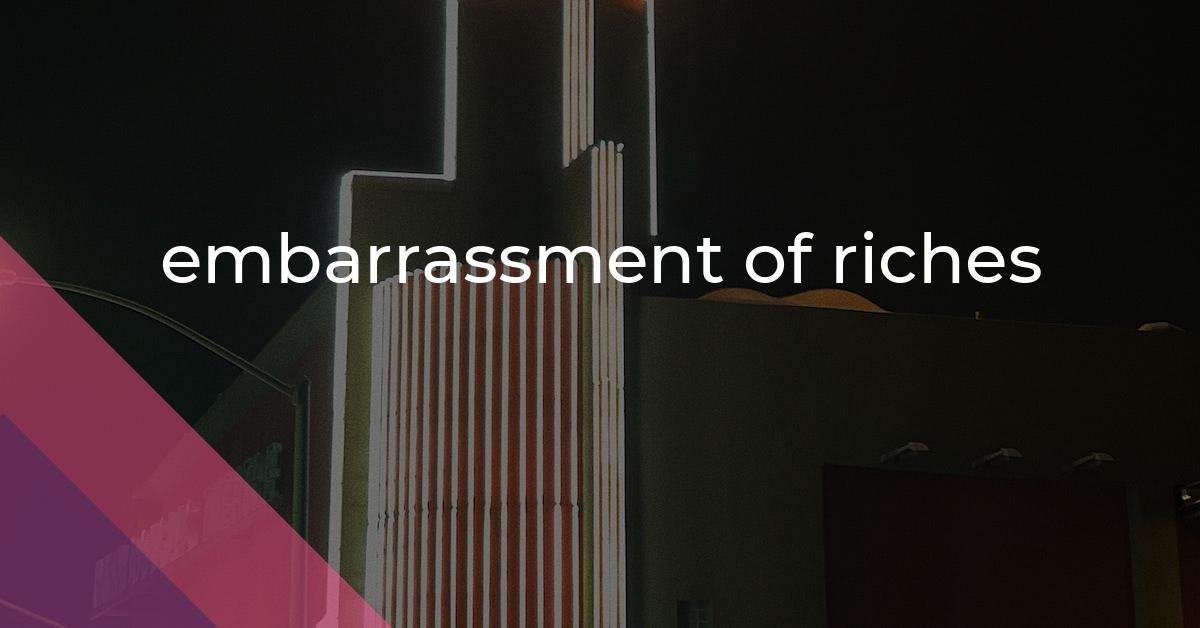embarrassment of riches: Idiom Meaning and Origin
What does ‘embarrassment of riches’ mean?
An "embarrassment of riches" refers to a situation where one has an excessive amount of wealth or resources, which can be overwhelming or troublesome.

Idiom Explorer
The idiom "lap of luxury" refers to a state of great comfort, wealth, and luxury. It suggests a life of abundance and indulgence.
The idiom "land poor" means to be wealthy in terms of owning land, but lacking the necessary funds or resources to maintain or develop it, resulting in financial difficulty.
The idiom "king's ransom" means an extremely large or exorbitant amount of money or valuable things.
The idiom "in the money" means to be in a financially successful or prosperous situation.
Meaning: Someone who spends a large portion of their income on housing expenses, leaving little money for other expenses or savings.
The idiom "high cotton" refers to a situation of great success, prosperity or abundance. It is often used to describe someone who is doing very well in terms of wealth, status or achievements.
The idiom "have more money than God" means to be extremely rich or wealthy beyond imagination.
The idiom "green with envy" is used to describe someone who is extremely jealous or envious of someone else's success or possessions.
The idiom "gold mine" refers to a valuable or profitable resource or opportunity that can lead to great riches or success.
Mortifying Moments Excess
Embarrassment of riches is an idiomatic expression that has its origins in French literature. This phrase, often used in English, refers to a situation where one has so much wealth or abundance that it becomes overwhelming and embarrassing. Having too much of something, especially wealth or possessions, can lead to difficulties or discomfort.
The term "embarrassment of riches" can be traced back to the 17th century, when French writer Jean de La Bruyère used it in his work "Les Caractères." He described a situation where a person has more resources or possessions than they know what to do with, resulting in a sense of unease or awkwardness.
Over time, the idiom made its way into the English language and gained popularity through literary works and common usage. Writers, poets, and scholars have frequently employed it to convey the idea of excessive abundance and the challenges it can bring. The metaphorical phrase captures the concept of a surplus that can create problems rather than bringing satisfaction or contentment.
The meaning behind "embarrassment of riches" extends beyond material wealth and can be applied to situations where one has an overwhelming number of choices or options. For example, if a person has multiple job offers, it can be referred to as an embarrassment of riches. The idiom implies that having too many choices can create a sense of confusion, indecision, or anxiety.
When discussing wealth inequality, the phrase "embarrassment of riches" serves as a reminder that having excessive wealth can lead to its own set of challenges. It highlights the idea that an abundance of resources may not always bring happiness or fulfillment and can sometimes result in feelings of guilt, discomfort, or isolation.
An additional idiom related to the concept of excessive wealth is "filthy rich." This phrase is often used to describe someone who has an immense amount of wealth. It emphasizes the idea that their wealth is excessive, to the point of being dirty or tainted. The use of "filthy" in this context is figurative, suggesting that the person's wealth is morally or ethically questionable.
The idiom "have more money than God" is another expression related to excessive wealth. This phrase implies that the person being described has an unimaginable amount of money, far beyond what is considered normal or reasonable. It emphasizes the vastness of their wealth, positioning them as almost god-like in their financial status.
When discussing excessive wealth and abundance, the idiom "lap of luxury" often comes to mind. This phrase is used to describe a lifestyle of extreme comfort and extravagance, typically associated with those who have great wealth. It suggests that the person leading such a life is surrounded by luxury on all sides, living in opulence and indulgence.
Another idiom related to excessive wealth is "deep pockets." This phrase refers to someone who has a significant amount of money and is willing to spend it freely. It implies that this person can afford to be generous or extravagant, as their wealth is not restricted or limited. They have the financial means to support their extravagant lifestyle or to contribute generously to others.
The idiom "cashed up" is also related to excessive wealth. It suggests that someone has a large amount of cash readily available to them. They have a surplus of money that they can access easily, without any financial constraints. This phrase conveys the idea of having a substantial amount of money on hand, ready to spend or invest as desired.
The idiom "embarrassment of riches" originated from French literature and has found its way into the English language. It reflects the notion of excessive abundance leading to difficulties or discomfort. This expression captures the concept of having more than one can handle, whether in terms of wealth, possessions, or choices. While it resonates with discussions on wealth inequality, it also serves as a reminder that an overabundance of resources may not always bring true contentment. The idiom prompts us to reflect on the complexities and potential drawbacks of having too much, while leaving open the possibilities for further exploration and interpretation.
Example usage
Examples of how the idiom embarrassment of riches can be used in a sentence:
- She had an embarrassment of riches in her closet, with dozens of designer dresses and shoes.
- After winning the lottery, John found himself faced with an embarrassment of riches and didn't know what to do with all his newfound wealth.
- As a food lover, visiting a buffet can be overwhelming because of the embarrassment of riches on display.
More "Wealth" idioms



